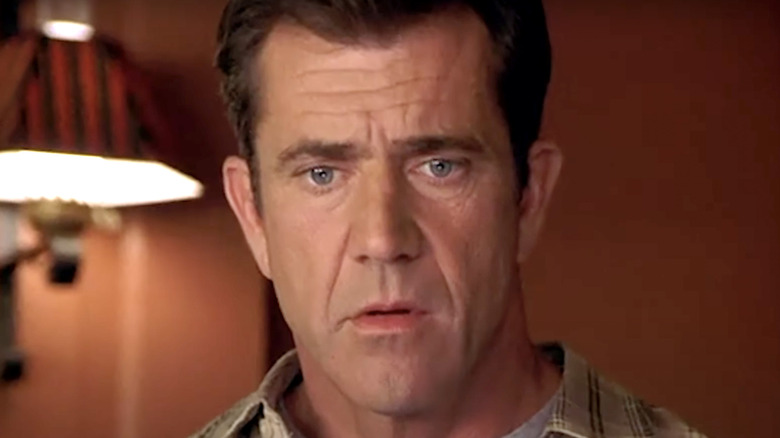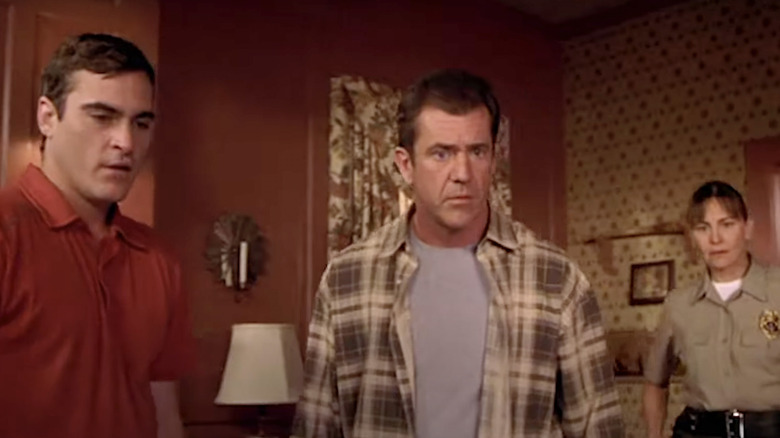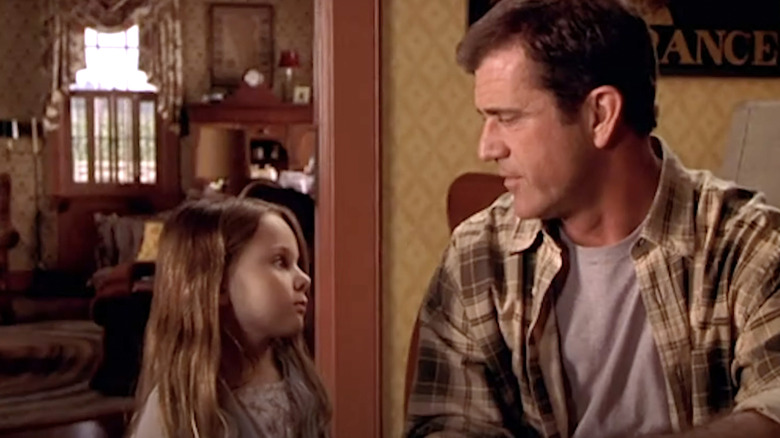The Ending Of Signs Explained
Before M. Night Shyamalan became one of Hollywood's most criticized directors, he stood as arguably one of the most lauded filmmakers in the world. Shyamalan's success with movies like "The Sixth Sense" and "Unbreakable" elevated him to the highest ranks of film auteurism. That is, until later movies like "Lady in the Water" and the regretful live-action "The Last Airbender" took a major toll on his reputation (via Rolling Stone). However, there were always signs that Shyamalan was a talented director, something which he proved after a critical comeback in the late 2010s with his film "Split." Before that, however, movies like "The Sixth Sense" proved he had the chops to be a great director, but none of his early films were quite so unique as 2002's "Signs."
In contrast to much of his work, "Signs" doesn't have a mind-blowing twist like "The Sixth Sense" or "The Village." Instead, the film's story of a grieving Midwestern family facing the prospect of a potential alien invasion ends with no grand revelation. The aliens, seemingly ignorant that Earth is covered in their one weakness, water, swiftly withdraw their invasion. Meanwhile, Graham Hess, the ex-priest protagonist played by Mel Gibson, successfully defends his family from a straggling alien invader. The twist, if there is any, is that Graham has been receiving "signs" of events to come that allow him to repair his broken faith in God. However, there's more to the messaging in the ending than you might expect.
Signs is about, well, signs
It's no big secret what the main theme of "Signs" is. Shyamalan spares no expense in making it clear when, at the end of the film, we see that Graham returns to the priesthood. "Signs" is about the struggle to keep one's faith when it seems like there's no longer a reason to. At first, Graham reacts to his wife's (Patricia Kalember) sudden death in a car accident as a random event, proof that his religion is false, and that not everything happens for a reason.
However, Graham witnesses too many coincidences throughout the film to truly ignore that this reasoning might be wrong. Too many events foreshadow the aliens and how Graham's family defeats the one who attacks them. Everything including his wife's last words, "Tell Merrill to swing away," his daughter's semi-prophetic dreams, and even his son's asthma are given a deeper meaning by the end of the film, as Merrill's (Joaquin Phoenix) killer bat-swing knocks the alien into the many glasses of water that his daughter, Bo (Abigail Breslin) has been leaving out for weeks. Meanwhile, Morgan's (Rory Culkin) asthma is the only thing that keeps him alive after he is unable to inhale the alien's poisonous fumes.
These coincidences give Graham a reason to pause and reevaluate his perspective. More of his wife's parting words, "Tell Graham to see," are also given clarity, and it's clear that Graham once again sees the signs that justify his faith.
But it's still about more than just religious faith
"Signs" may be a movie about faith, but it leaves it up to the individual to decide what this faith should be. It's easy to see "Signs" as an argument for belief in God because Graham is our protagonist as well as a priest. For other characters, however, this faith may be in something entirely different. On top of that, the signs that they see, and which justify their faith, are entirely different from the ones Graham and his family see.
Take, for instance, the Army recruiter that Merrill talks to. One main purpose of the scene between the two is to establish Merrill as an ex-baseball player with a herculean swing. However, it also foreshadows the alien invasion when the recruiter starts eerily talking about probing, and how the aliens are just sending down a reconnaissance force before they move in for the real invasion. Like every crackpot UFO theorist out there, he sees signs where others might not and that justifies the faith he has in his beliefs.
More so than faith in God, "Signs" is about people finding faith in anything and everything around them. Each character, whether they believe in gods or aliens, chooses to see signs in their life events. It's believing in those signs, more so than any actual god or alien, that gives their lives a sense of meaning.


